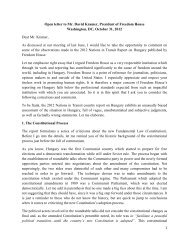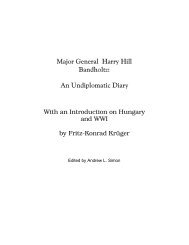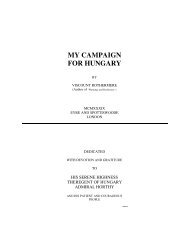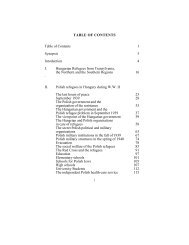The Fate of Western Hungary 1918-1921 - Corvinus Library ...
The Fate of Western Hungary 1918-1921 - Corvinus Library ...
The Fate of Western Hungary 1918-1921 - Corvinus Library ...
Create successful ePaper yourself
Turn your PDF publications into a flip-book with our unique Google optimized e-Paper software.
Zárány was taken into custody by a new unit <strong>of</strong> gendarmes arriving in the<br />
village and taken away with the charge <strong>of</strong> having been in collusion with the<br />
rebels. 359<br />
Still on September 7, an <strong>of</strong>ficer <strong>of</strong> the Entente Mission, British Captain<br />
Trother, met with delegates <strong>of</strong> two German-speaking villages in the border zone<br />
in Felsőőr (Oberwart). We learn from Lt.Col. Ferenczy’s report <strong>of</strong> the<br />
following day that: “<strong>The</strong>ir spokesman, the parish priest <strong>of</strong> Árokszállás, said,<br />
more or less, in his enthusiastic speech that they are appealing to the victors’<br />
chivalry and sense <strong>of</strong> fair play. <strong>The</strong>y ask that a sick <strong>Hungary</strong> not be driven into<br />
the arms <strong>of</strong> a dead Austria. <strong>The</strong>y would rather die than be part <strong>of</strong> ‘Red’ Austria.<br />
<strong>The</strong>y ask that the Entente Powers take note <strong>of</strong> this, all the more so because they<br />
are the representatives <strong>of</strong> purely German villages.” <strong>The</strong> lieutenant-colonel also<br />
reported: “<strong>The</strong> Entente <strong>of</strong>ficers are searching for the rebels, whom they would<br />
like to convince to retreat.” During the negotiations, they accepted that “the<br />
rebels act in the role <strong>of</strong> home guard” and that “the Entente <strong>of</strong>ficers deem it<br />
rightful that the population wants to defend itself by way <strong>of</strong> [its] home guard<br />
against ‘Red’ Austria.” 360<br />
As we have already written, the staff <strong>of</strong> Robert Davy, the appointed<br />
governor <strong>of</strong> Burgenland province, have moved from the Austian town <strong>of</strong><br />
Wiener Neustadt to Nagymarton in Sopron County. <strong>The</strong> governor travelled<br />
from here daily by car to the Entente Mission in Sopron. A public meeting was<br />
organized in Ágfalva, occupied by Austrian gendarmes, for September 7, where<br />
Davy also spoke and announced: “Morgen wird der Vormarsch nach Ödenburg<br />
vorgenommen!” [In the morning, we must press on to Sopron!] <strong>The</strong> mob – in<br />
which the leading shouters were people who arrived from Vienna and Wiener<br />
Neustadt – took up the chant: “Einmarsch! Einmarsch nach Ödenburg!” [Entry!<br />
Entry into Sopron!] at this time, the garrison <strong>of</strong> Ágfalva consisted <strong>of</strong> 400<br />
Austrian gendarmes, with six machine guns, which had a good chance <strong>of</strong> taking<br />
over the waterworks <strong>of</strong> Sopron, thus forcing the city to its knees. 361<br />
<strong>The</strong> Officer Company that joined the Ostenburg battalion had made<br />
preparations in the morning <strong>of</strong> September 6 to take and occupy Ágfalva. In<br />
preparation, Captain Viktor Maderspach and Elemér Székely, commander <strong>of</strong><br />
the company, set out on a scouting mission. Lajos Krug, intimately familiar<br />
with the neighborhood, got the assignment to obtain military maps <strong>of</strong> the<br />
village and its surroundings and mark any forest trails. On the following<br />
evening, about 100 rebels set out from Sopron towards Ágfalva, about six<br />
kilometers away. On the orders <strong>of</strong> Elemér Székely, the attack was begun at<br />
dawn on the 8 th but the Austrians put up a stronger than expected defense. In<br />
the heated exchange <strong>of</strong> fire, cadet Gyula Machatsek forestry engineer, reservist<br />
359 Ibid, pp. 386–388. <strong>The</strong> former Marxist-Communist historiography treated the 70<br />
gendarme report as truth, ignoring the fact that Count Sigray had ascertained by that<br />
evening that it was a lie. See, Soós, 1971, op. cit., p. 145.<br />
360 MOL. K 26. 1388. csomó. 1922–„H” tétel, p. 394.<br />
361 Krug, 1930, op. cit., p. 74.<br />
137
















